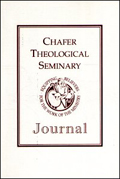We often hear that while works are not required for justification, they are the necessary result of justification and true saving faith. I argue that this makes works a condition of eternal life.
Here is the article so you can read it:
Are Works the Necessary Result of Justification?
See this follow-up article here:
The Relationship Between Faith and Works according to Three Systems of Theology


 I am a fundamentalist.
I am a fundamentalist.

 For example, if these three parables are talking about how Jesus goes out to find unsaved people, and the lost sheep, coins, and sons therefore represent all the people of the world, what is keeping us from a universalist interpretation of this passage, since Jesus doesn’t stop searching until he has gathered all 100 back into his fold?
For example, if these three parables are talking about how Jesus goes out to find unsaved people, and the lost sheep, coins, and sons therefore represent all the people of the world, what is keeping us from a universalist interpretation of this passage, since Jesus doesn’t stop searching until he has gathered all 100 back into his fold?


 I like fast food, but not always from the same place. I like the hamburgers from Wendy’s, the french fries from Burger King, and a soda from the convenience store ($0.59 for 32 oz!). Occasionally, when I have the time, I will actually eat my lunch this way, driving around to each location to get what I want.
I like fast food, but not always from the same place. I like the hamburgers from Wendy’s, the french fries from Burger King, and a soda from the convenience store ($0.59 for 32 oz!). Occasionally, when I have the time, I will actually eat my lunch this way, driving around to each location to get what I want.
 Sometimes, you just need to laugh. Especially with everything that has recently been in the news.
Sometimes, you just need to laugh. Especially with everything that has recently been in the news.


 For several years now, I have been mulling over a nagging question: “What is church?” How do you know the difference between a Bible study and church? Is there a difference?
For several years now, I have been mulling over a nagging question: “What is church?” How do you know the difference between a Bible study and church? Is there a difference?


